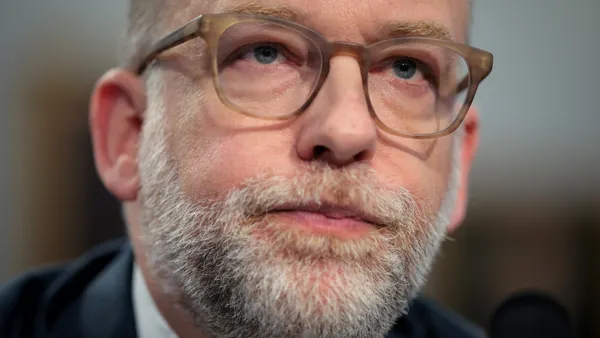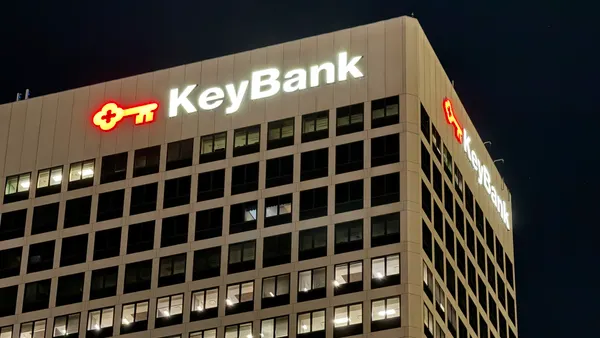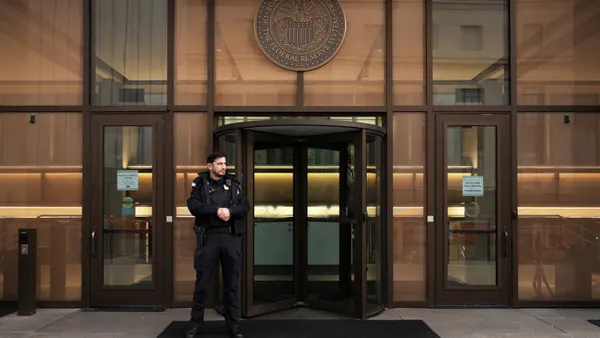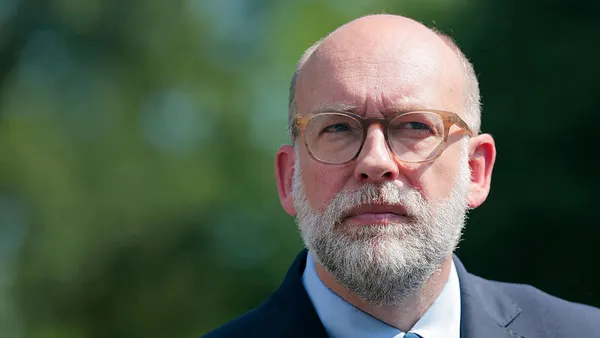When it comes to cryptocurrency, Comptroller of the Currency Jonathan Gould doesn’t want to take “an ostrich approach.”
“My view is that it's better for it to be done within the banking system, if it's legally permissible and can be done in a safe and sound manner, so that we can see it and monitor it, versus an ostrich approach, where we put our head in the sand and we're not really observing what's going on out there,” he said last week in an interview with Banking Dive at the Money20/20 conference in Las Vegas.
“If it's done in a regulated system like the banking system, we can take advantage of the upside and mitigate the downside,” he said. “That’s what the banking system is designed to do.”
The OCC, along with the other federal financial regulators, has adopted a crypto-friendly stance since President Donald Trump retook office in January. A number of crypto firms, including Coinbase, Circle, Paxos and Ripple, have applied this year for national trust charters, under which the OCC would allow them to launch new products and services with the assurance of regulatory clarity.
“It's in our interest, I think, to be very transparent what our expectations are and evaluate them on a case-by-case basis,” Gould said. “I don't subscribe to a risk-on-elimination approach.”
He called that approach “naive for a number of reasons,” including that “our banking system is just one part of a larger financial services system.”
“It's a really important component, but it's not a closed system, meaning if there are important financial intermediation activities that are going on, and if there are certain kind of customer needs or market needs that need to be met, and the banking system isn't going to meet them as a matter of policy, somebody else will in the financial services system,” he said.
Gould is no stranger to the crypto industry. During his last stint at the OCC, from 2018 to 2021, the agency chartered the first-ever crypto bank; and he spent much of 2022 as blockchain firm Bitfury’s chief legal officer. He then became a partner at the law firm Jones Day. In his personal capacity, he testified in front of a congressional subcommittee in 2023, addressing the Biden administration’s alleged attack on the crypto ecosystem.
Informed by his experience at Bitfury, he said crypto is “no longer this other,” and that he doesn’t view the relationship between traditional finance and digital assets “as antagonistic as sometimes people imagine them to be.”
“I can recall 10 years ago where it used to be the banks versus the fintechs, or even a couple years ago. But it converges over time,” Gould said. “Next thing you know, you get these banks raising their hands saying, ‘We're a fintech, look at our budget, look at how much we spend on tech.’”
Crypto’s volatility, he noted, was “not unrelated to why [he] left” Bitfury. But he said its volatility “doesn’t mean it’s not an important asset class. It just means people should be careful about investing in it unless they’re fully aware of and prepared for losses.”
Gould is similarly open to, though not as versed in, agentic artificial intelligence and its potential implications in the financial system.
There’s a phenomenon, he said, in which regulators, from a supervisory perspective, are “only comfortable with the very largest banks with the most sophisticated risk management or the largest balance sheets getting involved” in novel activities.
But with AI, there’s “a pretty positive story as to what it could do, including the possibility that it could help level the playing field between smaller banks and the very largest banks,” he said.
The OCC aims to take a balanced approach to AI’s potential and risks, he said.
“We’re trying to take a more balanced approach and not just solely focus on a parade of horribles,” he said. “It's our job to guard against those things and make sure banks are guarding against them, but fundamentally, there's also the other side of the coin, which is that the failure to innovate is itself a risk.”
Innovation keeps the banking system relevant over time, he added, and its potential “is itself a risk to the U.S. economy, which [the banking system is] there to support,” he said.











